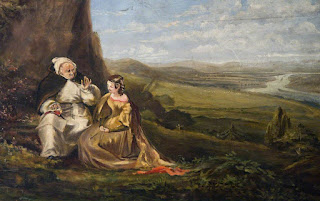Well, I am on the last lap of reading Scott's Waverley novels, having just finished The Fair Maid of Perth. There are just Anne of Geierstein (1829) and the 4th series of Tales of My Landlord (1832) to go. I read the former many years ago, but have yet to sample the delights of Count Robert of Paris and Castle Dangerous. But they are for 2022.
First edition 1828
The Fair Maid of Perth (its actual main title is Saint Valentine's Day) is packed with incident (one critic said it has no longueurs), only rarely flying towards total improbability or being too coincidental. These last two aspects the reader finds repeatedly in many of Scott's and his contemporaries' works. Mind you, they figure regularly in John Buchan's fiction and it is to him that I turn for the first comments on the Fair Maid.
...it must rank high among the novels which are based on book-work rather than on personal experience and a still living tradition. The scene was Scottish, and...the writer's imagination worked with ease and certainty...no book that I know shows so vividly the contrast, as well as the ties, between the compact municipal life and the savage outlands...the book abounds in memorable scenes, such as the trial by combat, the clan battle on the North Inch, and the murder of Rothsay, scenes which in mere narrative skill rank with the best in the earlier novels.
Other commentators with useful points include:
Hesketh Pearson, who can be overly critical of Scott, concurs with Buchan: figures being portrayed in his usual style and lifelike enough to keep the reader's interest alive. The novel was the best he wrote after Redgauntlet. Quite a good plot is embedded in the padding.
J. T. Christie: The Fair Maid, though not to be counted among the very best, deserves far more credit than it has been given.
Angus and Jenny Calder: certainly the best of his final novels...here we have for the first time a novel whose action is dominated by the solid and rising middle class, the burghers of the town of Perth.
Catherine Glover, the Fair Maid, is too conscientiously noble, and her pacifism becomes a burden (Buchan); resembles no living creature in Perth or on earth (Pearson); a little too good to be true...but less stagy than Scott's high-born maidens. She is exposed to more adventures than most (Christie) On occasions, she is perilously near to being a religious prig - "yonder four goodly convents, with their churches, and their towers, which tell the citizens with brazen voice, that they should think on their religious duties; - their inhabitants, who have separated themselves from the world, its pursuits and its pleasures, to dedicate themselves to the service of Heaven, - all bear witness, that if Scotland be a bloody and a sinful land, she is yet alive and sensible to the claims which religion demands of the human race". Her father, Simon Glover, suggests "she is now like to be called on to be an angel in heaven, and to be transported thither in a chariot of fire", after listening to her Lollard Father.
Henry Gow is the most authoritative and active character in the novel...a mixture of the noble and courageous, and the old and the humble...a man who could contain something of the qualities of each level of society...it is chiefly the personality and function of Henry that give the novel its strength (Calders) ...though his appearance was neither dignified nor handsome, his face and figure were not only deserving of attention, but seemed in some manner to command it.
King Robert III is well described: he had many virtues, and was not without talent; but it was his great misfortune, that, like others of his devoted line, his merits were not of a kind suited to the part which he was called upon to perform in life`
The villains like the cold-hearted, wily Duke of Albany; the ferocious Earl of Douglas; Ramorny and Bonthron and Henbane Dwining are satisfying rascals. The latter two are rightly hanged from the battlements.
Prince David of Rothsay is not a straightforward villain but a complex personality...we are to see Rothsay in many aspects - as a clever counsellor, a drunken rake, a shamefaced liar, and, finally, a figure of great pathos. (Angus and Jenny Calder) As Scott describes him, there was on his brow a haggard paleness, which seemed the effect of care or of dissipation, or of both these wasting causes combined. His eyes were sunk and dim...while his cheek was inflamed with unnatural red...
Conacher, aka Ian Eachin MacIan, son to the Chief of the Clan Quhele (in part a peace offering from Scott to the memory of his youngest brother Daniel, guilty of cowardice in Jamaica) is not held up for our admiration, but he is allowed some nobility of character...full of romantic impulse but lacking steadfast courage (Christie); Conacher who, for all his spirit, fails in the commoner kinds of courage, and is his best portrait of a character frustrate and divided (Buchan);
Only Henbane Dwining - a prototype of the mad scientist, with his annoying 'he-he-he' outbursts - is too far-fetched a character.
I thoroughly enjoyed this 'late' Scott and place the novel certainly in his top ten. The author keeps a tighter control than usual on his storyline and his characters are all living creatures. The Fair Maid herself comes alive a little towards the end, but she is nothing like the most interesting in the cast. So, on to Anne of Geierstein in the New Year.



No comments:
Post a Comment